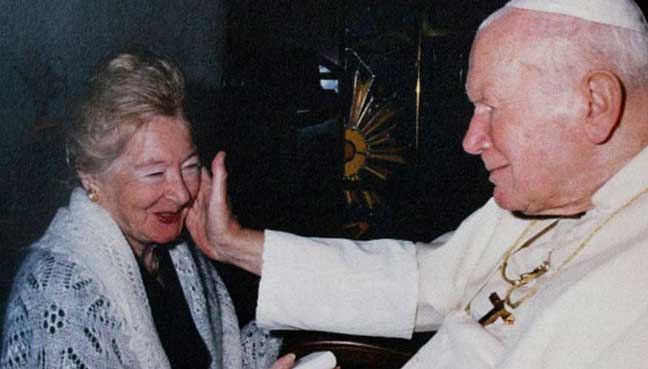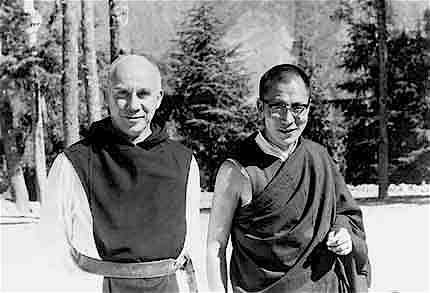|
My wife and I watched the BBC documentary on Pope John Paul II and the female philosopher.
His long intellectual and emotional friendship reminded us of a Sunday picnic at Gethsemani Abbey in Kentucky in 1971. The most famous member of that abbey, Thomas Merton, had died nearly three years earlier, in Bangkok, on his journey outward from the rolling hills and cheese production and long silences, but he was still a presence, the reason we were there. A few members of the Merton society, new friends who had welcomed us to Louisville, invited us to visit the abbey on Sunday, when the Monks, Merton’s peers, were allowed to speak, to meet visitors. We were not prepared for the rush of energy from five monks, who mingled with us on the lawn on a gorgeous afternoon. They were polite to me, eager to talk to my wife, who had packed a picnic basket. “They wanted to talk to me, not formally, just ‘It’s my turn now.’” Marianne recalls. “I probably spent 10-15 minutes alone with each of them, one on one.” I remember being escorted on a tour of the abbey – the sparse rooms, perhaps a chapel, the rooms where they made cheese. They kept me busy. I understood. “They all said how much they missed talking with women,” my wife remembers. “They said they laughed differently with women than with men. They talked about their mothers and their sisters. One man said he felt sad that he would never be a father and wanted to know what it was like to raise children.” Four decades later, she fondly remembers these men acknowledging the gap in their lives, the part they had given up for their spiritual mission. Merton was the man in the room who wasn’t there. He was the worldly member, born in the Catalan corner of southwest France, shuttled around Europe, studied at Columbia University in New York City, lived, explored, thought, wrote, was refused the priesthood because of his worldly past, so he became a monk, seeking peace and quiet. He became a celebrity through his writings, met the Dalai Lama, and then, quite apparently, while recuperating in a hospital in Louisville, had a brief affair with a young nurse. He was in Bangkok, when he died, electrocuted by faulty wiring on a fan, as he left the shower, far from the quiet abbey in central Kentucky. There is no moral to this, no talk of sin or weakness, no screed against celibacy, against monasticism. Merton needed to speak out against war, against injustice. The former Karol Wojtyla from Krakow expressed himself in a complicated relationship with a worldly married woman, Anna-Teresa Tymieniecka, who lived in America. The documentary said there is no reason to believe they had a physical relationship, and I believe that, from my impressions of him, up close. He was a strong man, in every sense. I first saw John Paul II in person at a dude ranch outside Mexico City in 1979, on his first journey as Pope. He told us we should regard journalism as a vocation, a calling. I have never forgotten that. He was a force, even when I did not agree with his politics. I saw him up close again in the fall of 1979 when he was striding across a heritage farm in Iowa, greeting Lutherans. As he moved across the turf, his strength, his stride, his jutting jaw, reminded me of a linebacker stalking a quarterback. (That’s when the security guard elbowed me, said I was getting too close.) I believe that Karol Wojtyla was quite capable of being Pope and dear friend at the same time, although it sounds as if his friend had other ideas. The documentary showed their letters and also his sturdy face, even in old age and illness, visibly happy whenever he saw his friend. He reminded me of the monks at the abbey, who told my wife they missed women. 4/14/2016 12:18:20 pm
George-A very moving remembrance.
George
4/14/2016 05:41:07 pm
Alan, what a nice honor. I'll remember that about Josh. Just curious, was your friend talking about John 23? JP II didn't bend much. Spent his years dealing with their good friends from the East. Gv
Ed Martin
4/14/2016 01:21:30 pm
It is not a new thought to me. When the string on Merle Haggard column was growing, I thought, "is there a sports-oriented (and so much more) column anywhere that attracts this kind of audience? It is, of course, a tribute to GV and his 'Man for All Seasons" -in the best sense-humanism. This column and Alan's response is an example.
George Vecsey
4/14/2016 08:19:53 pm
Ed, thanks so much. I enjoy the community, and it is fun to write what I like and not have to sell it and negotiate it through editors -- a necessary process for a paper, but not here. I like bringing up things I was lucky enough to cover. See you in NY. GV
Brian Savin
4/14/2016 08:36:40 pm
Yes, Ed, we read this blog because we miss the Sports of the Times column that this man cherished and elevated. In fact, he might have perfected it. That important column has died upon his retirement. Still, we celebrate that it opened our eyes to new experiences and made us read stuff at least I wouldn't have otherwise, and that I appreciated. The column was a beacon that called to us. This particular GV post is an example of what we miss in the NYT.
George Vecsey
4/15/2016 07:48:15 am
Brian, I appreciate the nice words. The site is my therapy. I love to write every day. Went nuts when the NYT had us doing four columns a week (Daley and Smith did four). Three was better...I liked skimming on the wave with the news..and on more or less regular days...it made me creative and look for new stimuli.
Josh Rubin
4/14/2016 10:38:56 pm
Just to clarify, my middle name is Paul. I believe Pope Paul was selected not long before I was born in 1963. I guess if Jesus was Jewish, it's okay for me to be named after a pope.
George Vecsey
4/15/2016 08:02:25 am
Josh, got it. So you were named for Montini. 4/15/2016 09:59:54 am
Sorry George, I got my Popes mixed up. Pope Paul VI was elected on June 21, 1963 and Josh was born on July 3rd.
George Vecsey
4/15/2016 12:04:17 pm
You could have named him Innocent...or Pius. Comments are closed.
|
Categories
All
|











